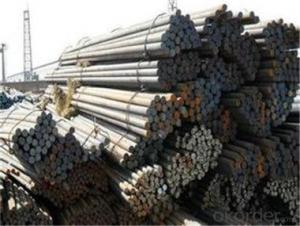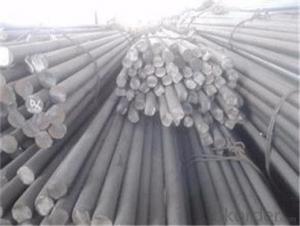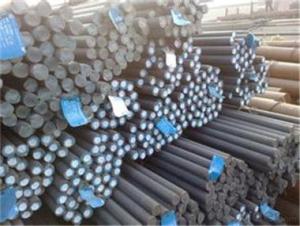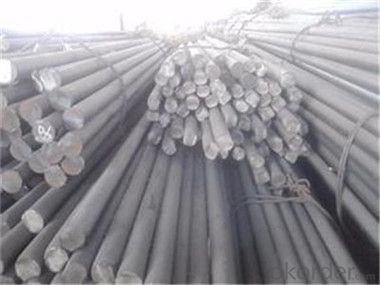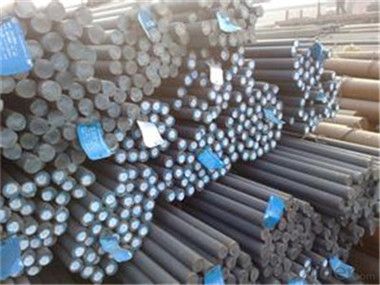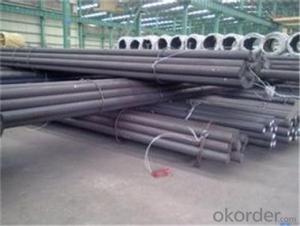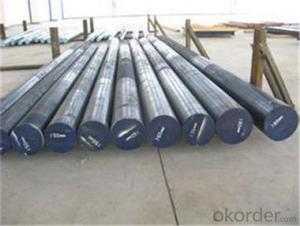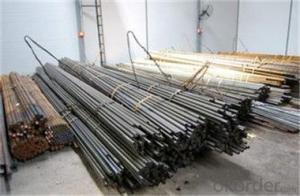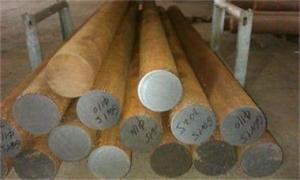Hard Chrome Carbon Steel Round Bar with Good Quality-CNBM
- Loading Port:
- Tianjin
- Payment Terms:
- TT OR LC
- Min Order Qty:
- 87 m.t.
- Supply Capability:
- 2000000 m.t./month
OKorder Service Pledge
OKorder Financial Service
You Might Also Like
Description of steel round bar:
1.Diameter 80 to 800 mm
2.Black or Bright surface
Festures of steel round bar:
4340 Forged Round Steel Bar
1.Dia 80-800mm Length:2000-13000mm or as required
2.Technique:Forged
3.Delivery Time:45 days
Specifications of steel round bar:
Description |
Carbon Steel Rod/Carbon Steel Bar,carbon steel rod,carbon steel shaft,mild steel bar, mild steel shaft,ms bar | |
Material | ASTM | 1005,1006,1008,1010,1015,1020,1025,1030,1035,1040,1045,1050,1055,1060,1065,1070,1080,1084, 1016,1022 |
DIN | Ck10,Ck15,Ck22,Ck25,Ck30,Ck35,Ck40,Ck45,Ck50, 30Mn4,40Mn4 | |
BS | 040A04,095M15,045M10,080A40,045M10,080M50 | |
Standard | GB/T799,ASTM A29,A108,A321,A575,BS970,DIN1652,JIS G4051 | |
Section shape |
Round | |
Length |
As your required | |
Application | Carbon steel rod applies to chemical industry, shipping industry, manufacturing industry,construction,decorate Industry,electric power, pump shafts, sanitary wares,furniture handles,boiler,high temperature resistant,low temperature resistant, corrosion resistant. | |
Images of steel round bar:
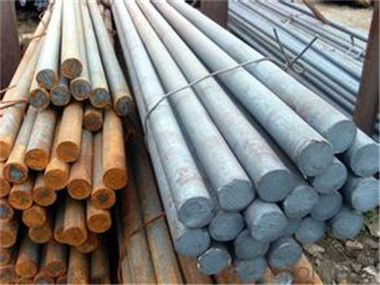
FAQ:
1. What is your package?
Packing situation: standard seaworthy packing or as customer required.
2. How long is the lead time?
Delivery time: 45 days after order confirmed.
3. What payment term do you accept?
Payment: T/T or L/C at sight.
- Q: What is the modulus of elasticity of a steel round bar?
- Young's modulus, also known as the modulus of elasticity, is a crucial measure when assessing the stiffness and ability of a steel round bar to resist deformation under an external force. Generally, the modulus of elasticity for steel is around 200 GPa. Consequently, when a unit of stress is applied to the steel round bar, it will undergo an elastic deformation ranging from approximately 0.0035 to 0.005, depending on the specific grade and composition of the steel. Hence, the modulus of elasticity plays a significant role in structural and mechanical engineering applications, as it dictates the level of deflection or deformation to be expected under various loading conditions.
- Q: How do you calculate the torsional strength of a steel round bar?
- To calculate the torsional strength of a steel round bar, you need to consider its material properties, such as the shear modulus and the cross-sectional area of the bar. The torsional strength can be determined using the formula T = (G * J * tau) / L, where T is the torsional strength, G is the shear modulus, J is the polar moment of inertia, tau is the shear stress, and L is the length of the bar.
- Q: Are steel round bars prone to fatigue failure?
- Fatigue failure is a common occurrence in steel round bars, which can be attributed to repeated cyclic loading or stress. This leads to a gradual weakening of the material, eventually causing it to fail, even if the applied stress is below its ultimate strength. Due to their inherent characteristics, steel round bars, like other structural materials, are susceptible to fatigue failure. Various factors can contribute to fatigue failure in steel round bars, including improper design, inadequate material selection, manufacturing defects, and excessive cyclic loading. Additionally, surface defects, notches, stress concentrations, and corrosive environments can further accelerate the fatigue process. Engineers and designers take several measures to mitigate the risk of fatigue failure. These include implementing appropriate design practices, selecting high-quality materials, conducting thorough inspections, applying stress-relieving treatments, and considering the impact of cyclic loading during the structural design phase. It is important to understand that the susceptibility of steel round bars to fatigue failure depends on multiple factors, such as the specific steel grade, loading conditions, environmental factors, and overall structural design. Therefore, it is crucial to carefully assess these factors and employ appropriate mitigation measures to ensure the safe and reliable performance of steel round bars in various applications.
- Q: What are the safety precautions when handling steel round bars?
- When handling steel round bars, there are several important safety precautions that should be followed to minimize the risk of accidents or injuries. 1. Personal Protective Equipment (PPE): Always wear appropriate PPE such as safety goggles, gloves, steel-toed boots, and a hard hat. These protective gears help protect against potential hazards such as flying debris, sharp edges, and heavy objects. 2. Proper Lifting and Carrying Techniques: Steel round bars can be heavy and cumbersome, so it is important to use proper lifting techniques to avoid strain or injury. Lift with your legs, keeping your back straight, and avoid twisting or jerking motions. If the bars are too heavy to lift alone, ask for assistance or use mechanical aids like forklifts or cranes. 3. Secure Storage and Stacking: When storing or stacking steel round bars, ensure they are properly secured and organized. Use appropriate storage racks or A-frames to prevent them from tipping over or falling, which could cause serious injuries. If stacking multiple bars, use spacers or shims to maintain stability. 4. Avoid Sharp Edges: Steel round bars may have sharp edges or burrs, so be cautious when handling them. Wear gloves to protect your hands and avoid dragging or sliding the bars, as this can cause cuts or abrasions. 5. Proper Handling Techniques: When moving steel round bars, always maintain a firm grip and be aware of your surroundings. Do not swing or throw the bars, as they could hit someone or cause damage. Instead, walk slowly and steadily, ensuring clear paths and ample space to maneuver. 6. Inspection for Defects: Before using steel round bars, inspect them for any defects or damage. Look for cracks, dents, or deformities that could compromise their structural integrity. If any issues are found, do not use the bars and report them to a supervisor or quality control personnel. 7. Fire Safety: Steel round bars are highly flammable when exposed to extreme heat or sparks. Therefore, avoid working near open flames or hot work areas. Keep fire extinguishers nearby and ensure everyone is trained in fire safety protocols. By following these safety precautions, you can significantly reduce the risks associated with handling steel round bars and create a safer work environment.
- Q: What is the maximum length of a steel round bar that can be manufactured?
- The maximum length of a steel round bar that can be manufactured is dependent on several factors, including the diameter or thickness of the bar and the limitations of the manufacturing process. In general, steel round bars can be produced in lengths ranging from a few feet to several hundred feet or even longer. However, it is important to note that as the length of the bar increases, it becomes more challenging to maintain its straightness and dimensional accuracy. This is particularly true for thinner or larger diameter bars, as they are more prone to bending or warping during the manufacturing process. Additionally, logistical constraints such as transportation and handling may also impose limitations on the maximum length of a steel round bar that can be manufactured and delivered efficiently. Therefore, the maximum length of a steel round bar that can be manufactured is not a fixed value, but rather depends on various factors related to the specific requirements, capabilities, and limitations of the manufacturer and the application for which the bar is intended.
- Q: Can steel round bars be used for making tools or machinery parts?
- Yes, steel round bars can be used for making tools or machinery parts. Steel round bars are known for their high strength, durability, and resistance to wear and tear. These properties make them ideal for applications in the manufacturing of tools and machinery parts that require high strength and reliability. Steel round bars can be machined, forged, or heat-treated to achieve the desired shape and properties required for specific tools or machinery parts. Additionally, steel round bars come in various grades, each with its own specific properties, allowing manufacturers to select the most suitable grade for their specific application. Overall, steel round bars are a versatile and commonly used material in the manufacturing industry for making tools and machinery parts.
- Q: Can steel round bars be used for making rebar?
- No, steel round bars cannot be used for making rebar. Rebar, or reinforcing bar, is specifically designed and manufactured with deformations or ribs on its surface to enhance the bond with concrete. These deformations provide better grip and prevent slippage between the rebar and concrete, thus improving the structural integrity of a reinforced concrete structure. On the other hand, steel round bars have a smooth surface and lack the necessary deformations, making them unsuitable for rebar applications. It is important to use rebar that meets the required standards and specifications to ensure the safety and durability of the concrete structure.
- Q: Can steel round bars be painted or coated?
- Yes, steel round bars can be painted or coated. Painting or coating steel round bars is a common practice to enhance their appearance, protect them from corrosion, and provide additional functionality. The process typically involves cleaning the surface of the bars to remove any dirt, grease, or rust, and then applying a primer or base coat followed by a topcoat or finish. The type of paint or coating used will depend on the specific requirements of the application, such as the desired color, level of protection, or resistance to environmental conditions. Additionally, certain coatings can provide specific properties like anti-slip, heat resistance, or chemical resistance. Overall, painting or coating steel round bars is an effective way to improve their aesthetics and durability.
- Q: Can steel round bars be used in the agriculture industry?
- Yes, steel round bars can be used in the agriculture industry. They are commonly used for applications such as building fences, constructing equipment, and supporting structures for agricultural buildings. Steel round bars offer durability, strength, and versatility, making them suitable for various agricultural applications.
- Q: What are the advantages of using carbon-manganese alloy steel round bars?
- Carbon-manganese alloy steel round bars offer several advantages. Firstly, they possess excellent strength and durability, making them ideal for applications requiring high mechanical properties. Additionally, the presence of manganese enhances the hardenability of the steel, allowing it to be easily heat-treated to achieve desired hardness levels. Moreover, carbon-manganese alloy steel round bars exhibit good weldability and machinability, making them versatile and easy to work with. Lastly, they provide cost advantages as they are relatively affordable compared to other high-strength steel options.
Send your message to us
Hard Chrome Carbon Steel Round Bar with Good Quality-CNBM
- Loading Port:
- Tianjin
- Payment Terms:
- TT OR LC
- Min Order Qty:
- 87 m.t.
- Supply Capability:
- 2000000 m.t./month
OKorder Service Pledge
OKorder Financial Service
Similar products
Hot products
Hot Searches
Related keywords
